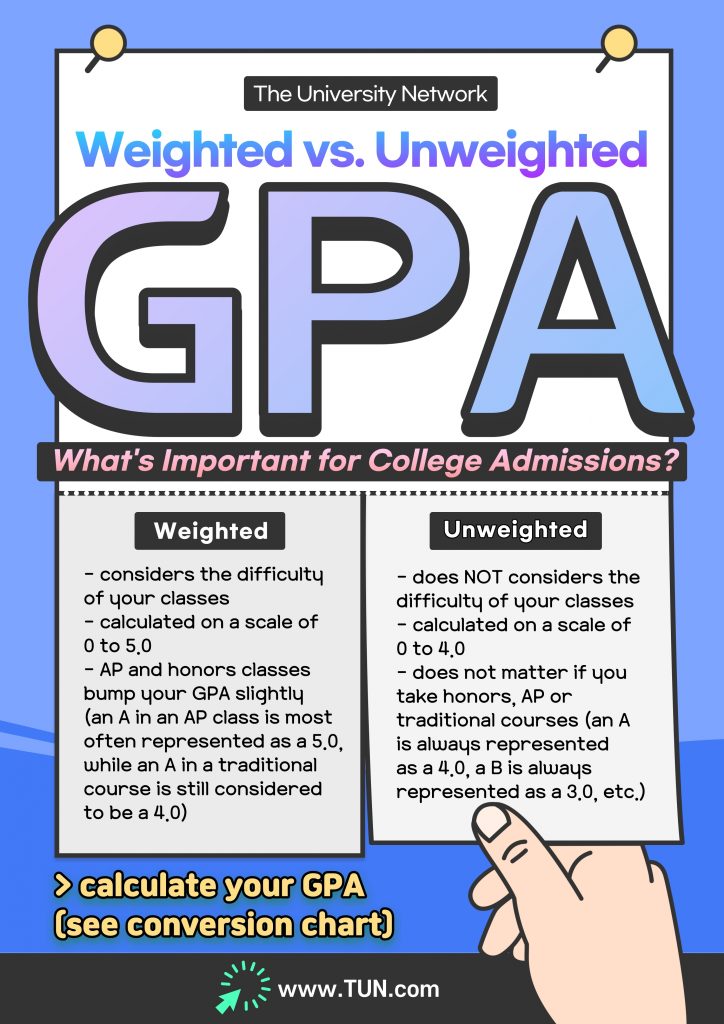Grade Point Average (GPA) is one of the most important factors that colleges and universities consider while making admissions decisions. But, high schools don’t always calculate students’ GPAs the same way. Some high schools calculate GPA on an “unweighted” scale and some use a “weighted” scale.
In this article, we explain the differences between both types of GPA, show you how to calculate your GPA using both scales, and explain how they impact college admissions decisions.

Difference between unweighted GPA & weighted GPA
The main difference between the two is that a weighted GPA considers the difficulty of your classes and an unweighted GPA does not.
Unweighted GPAs are calculated on a scale of 0 to 4.0. It does not matter if you take honors classes, AP classes, or traditional courses, an A is always represented as a 4.0, a B is always represented as a 3.0, and so on.
Weighted GPAs are most often calculated on a scale of 0 to 5.0. On a weighted scale, you’re rewarded for taking AP and honors classes by getting a slight bump to your GPA. On a weighted scale, an A in an AP class is most often represented as a 5.0, while an A in a traditional course is still considered to be a 4.0.
How to calculate your unweighted GPA
Unweighted GPAs are generally easier to calculate than weighted GPAs because you don’t have to factor in the strength of your schedule.
No matter which class you’re taking, on the unweighted scale, an A is equal to a 4.0, a B is equal to a 3.0, a C is equal to a 2.0, a D is equal to a 1.0, and an F is equal to a 0.
To calculate your unweighted GPA, all you have to do is add up the numbers that correspond with your letter grades and divide the total by the number of classes that you took.
For example, let’s say that you took five classes this past quarter. If you got As in three of them and Bs in two of them, your unweighted GPA would come out to be a 3.6.
The equation would look like this:
(4.0 + 4.0 + 4.0 + 3.0 + 3.0) ÷ 5 = total GPA of 3.6
You can follow this same formula to calculate your cumulative unweighted GPA.
To help you out, below is a letter grade to GPA conversion chart.
Letter Grade to GPA Conversion Chart
| Letter Grade | Number Grade | GPA |
| A+ | 97-100 | 4.0 |
| A | 93-96 | 4.0 |
| A- | 90-92 | 3.7 |
| B+ | 87-89 | 3.3 |
| B | 83-86 | 3.0 |
| B- | 80-82 | 2.7 |
| C+ | 77-79 | 2.3 |
| C | 73-76 | 2.0 |
| C- | 70-72 | 1.7 |
| D+ | 67-69 | 1.3 |
| D | 65-66 | 1.0 |
| F | Below 65 | 0 |
How to calculate your weighted GPA
Weighted GPAs are more difficult to calculate, because they vary based on the classes you’re taking. AP and honors classes are weighted higher.
Although it may depend on the high school, the general rule of thumb is that you get an extra 1.0 added for taking an AP class and an extra 0.5 added for taking an honors class.
For example, while an A in a traditional class still equals a 4.0, an A in an AP class is typically considered to be a 5.0, and an A in an honors class is typically considered to be a 4.5.
Let’s say you took five classes, two of which were AP classes, one of which was honors, and the remaining two were traditional classes.
If you got As in both of your AP classes, a B in your honors class, and As in both of your traditional classes, your GPA would be a 4.3.
The equation would look like this:
(5.0 + 5.0 + 3.5 + 4.0 + 4.0) ÷ 5 = total GPA of 4.3
Again, you can follow this same formula to calculate your cumulative weighted GPA.
Below are two conversion charts to help you determine your GPA in AP and honors classes.
Conversion Chart for AP Classes
| Letter Grade | Number Grade | GPA |
| A+ | 97-100 | 5.0 |
| A | 93-96 | 5.0 |
| A- | 90-92 | 4.7 |
| B+ | 87-89 | 4.3 |
| B | 83-86 | 4.0 |
| B- | 80-82 | 3.7 |
| C+ | 77-79 | 3.3 |
| C | 73-76 | 3.0 |
| C- | 70-72 | 2.7 |
| D+ | 67-69 | 2.3 |
| D | 65-66 | 2.0 |
| F | Below 65 | 1.0 |
Conversion Chart for Honors Classes
| Letter Grade | Number Grade | GPA |
| A+ | 97-100 | 4.5 |
| A | 93-96 | 4.5 |
| A- | 90-92 | 4.2 |
| B+ | 87-89 | 3.8 |
| B | 83-86 | 3.5 |
| B- | 80-82 | 3.2 |
| C+ | 77-79 | 2.8 |
| C | 73-76 | 2.5 |
| C- | 70-72 | 2.2 |
| D+ | 67-69 | 1.8 |
| D | 65-66 | 1.5 |
| F | Below 65 | 0.5 |
What role does weighted GPAs play in college admissions?
Weighted GPAs sure do look more appealing than unweighted GPAs. If you go to a high school that uses the weighted system and are taking a lot of AP and honors classes, your GPA is going to be significantly higher than that of the student taking the same classes and making the same grades at a neighboring high school that uses the unweighted system.
But, the truth is that your actual GPA, whether it is calculated on an unweighted or weighted scale, does not matter all that much. A good GPA may be an impressive thing to tell your family members or brag about to your friends, but admissions officers are much more focused on the story behind your GPA.
Immediately after seeing your GPA, college admissions officers will look at your full transcript. They will be able to see each class you took and the actual grade that you earned in each of your classes. From there, they will be able to contextualize your GPA and accurately compare your academic achievements with those of other applicants.
In terms of admissions, it’s much more important to focus on taking difficult classes and scoring well in them than it is to focus on achieving the best GPA possible. Universities, particularly selective institutions, prioritize students who challenge themselves.
“Whenever you can, challenge yourself with the most rigorous courses possible, such as honors, Advanced Placement (AP) and dual-enrollment courses,” Princeton’s admissions department states in a message.
Yale’s admissions department has a similar message: “We look for students who have consistently taken a broad range of challenging courses in high school and have done well.”
When Harvard admissions officers evaluate applicants, they consider questions like, “Have you reached your maximum academic and personal potential?” and “Have you been working to capacity in your academic pursuits?”
All in all, a student who took all easy courses and got a perfect 4.0 on an unweighted scale may not have a chance to be admitted to a highly selective institution. Despite that student’s perfect GPA, admissions officers will be able to see that the student did not challenge herself.
Don’t ignore your GPA entirely
Although your GPA should not be your main focus, you don’t want to ignore it entirely.
While most institutions take a holistic approach to reviewing applicants, some large public institutions get so many applicants that they simply don’t have the time to review the profiles of every applicant who wants to apply. For that reason, some institutions, including the University of Florida and the University of Mississippi, have minimum GPA requirements. These GPA requirements, however, are typically pretty low, as they usually hover around a 2.0.
Your GPA can also impact the scholarships that you’re eligible for. The state of South Carolina, for example, offers the LIFE scholarship, which is a semester-based scholarship worth up to nearly $20,000 over four years. Students with a GPA below 3.0 on an unweighted scale are not eligible for the scholarship.
The last reason that you shouldn’t ignore your GPA entirely is that it affects your class rank, which is determined by comparing your GPA with the GPAs of other students in your grade.
Some institutions, such as the University of Central Florida, offer students guaranteed admission if they rank in the top 10 percent of their graduating class. Additionally, some scholarships are also determined based on class rank.
Fewer and fewer high schools are using class ranking systems nowadays, largely because class rank is not always a fair indicator of a student’s academic abilities.
At a high school that uses an unweighted grading system, for example, a student who takes all AP classes and has a few Bs in those classes would rank below a student who only takes easy classes and has As in all of them.
Conclusion
It is easy to get caught up in the details. However, the bottom line is that colleges care more about the classes you take and the grades you score in them than about your GPA, whether it is on a weighted or unweighted scale. As long as you challenge yourself by taking advanced courses and keep your grades in the A–B range, you’ll be in a good position come admissions season.



